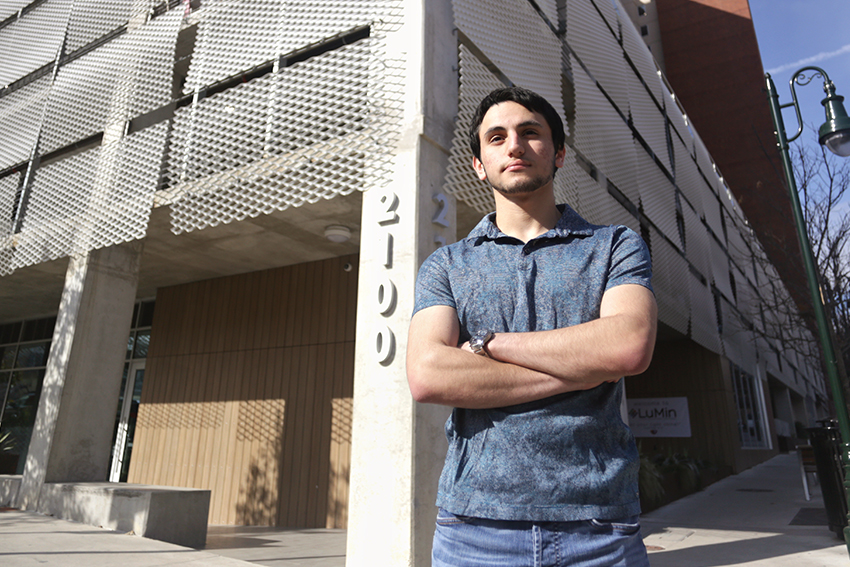There is almost no reason University House could have legally terminated student leases as they did late last year, Sylvia Holmes, associate director of UT legal services, said.
Two weeks ago, The Daily Texan reported on a UH software error that caused them to overbook for the 2018–19 term. Multiple students’ leases were terminated as a result. UH claimed it was a “one-time” error, but further reporting revealed it happened the previous year, too.
When a renter signs a lease, their landlord is legally obligated to provide them a place to live, Holmes said. The select circumstance that can invalidate this agreement is referred to as an “act of God.” If a disaster renders the residence uninhabitable through no fault of the landlord, then all parties are released from the contract.
UH overbooking due to a “software error” does not qualify for this kind of impossibility, Holmes said.
“That is the landlord’s mistake for failing to properly supervise their leasing staff when they signed all the leases,” Holmes said.
Despite UH illegally terminating multiple student leases in December, it is unlikely the students could win a lawsuit against the complex, Holmes said.
To sue, the tenant must have suffered damages. To prove this, Holmes said one of the most important elements is how much notice the tenant received regarding the termination.
If, for example, a tenant’s lease was terminated five days before their planned move-in, then Holmes said they could probably win a lawsuit. Tenants could easily prove they could not be reasonably expected to find housing of similar quality and price and be able move-in in such a short period of time, Holmes said.
“If I give you five months notice, well, yes, I’m breaching the lease, but you’ve got five months to find a new place in which case you probably won’t be damaged,” Holmes said. “It’s more of a ‘How dare you?’”
The terminated UH tenants were given nearly nine months warning, so it would be hard to prove damages, Holmes said.
Students with questions or issues regarding leasing or any other legal issue can contact Legal Services for Students in the Office of the Dean of Students.
A Lack of Knowledge
Every student who told The Daily Texan they experienced problems with UH reiterated one issue: They said they felt their inexperience with leasing was used against them.
“Many students barely know what a lease is,” said Plan II freshman Rylan Maksoud, whose online review of UH following his lease’s termination late last year sparked the controversy now surrounding the complex. “When a big corporation like The Scion Group takes advantage of students … there’s just no excuse.”
Holmes said everyone, not just students, is vulnerable to deceptive leasing practices. Leases are long and incredibly detailed, and it can be easy to miss important aspects that could potentially help or harm the tenant.
In UH’s lease specifically, there is a clause that says if they are unable to offer the apartment type for which the tenant signed, then they will place you in a more expensive apartment with the original rent.
“This may be a great moment for all university students to learn why what they signed matters,” Holmes said. “Because what they signed strikes me as protecting them right now.”
Several students said instead of being offered this deal, they were given an entirely new lease, binding them to a higher rate. Even though they could have rejected the new lease, most said they thought it was their only option.
“When you’re a freshman living in a dorm, it’s really difficult for you to know (how leasing works),” said finance sophomore Anoop Kumar, who took on a more expensive lease from UT because they sold out of his apartment floorplan in 2016. “It’s kind of like signing up for classes, really, but classes won’t kick you out.”
Another issue students said they faced was trouble getting in contact with UH throughout the leasing process. With this, Holmes said the only time landlords are legally required to respond is if they receive a written, mailed letter.
“Email never counts, not for any purpose under the law,” Holmes said.
The last element of UH’s lease that Holmes said students might miss is the way rent payments are set up. A standard Texas Apartment Association lease requires the tenant pay a monthly rent for the duration of the lease. UH’s lease, however, charges the tenant for one year’s worth of rent that they break up into 12 installments.
The difference, Holmes said, is that if the TAA lease is broken, the tenant only owes the current month’s rent. With UH’s lease, which Holmes said is common in West Campus and Riverside, the tenant would be held accountable for the rest of the year’s rent.
“(The leases) look the same, but they are completely different,” Holmes said.
Correction: A previous version of this article called "Legal Services for Students in the Office of the Dean of Students" "University Legal Services." The article has been updated to reflect the correct name of the office. The Texan regrets this error.





















